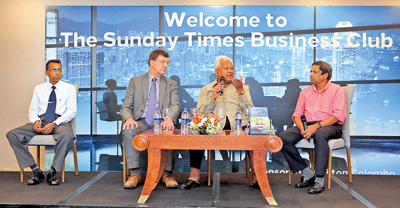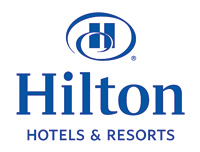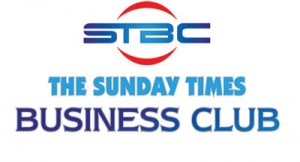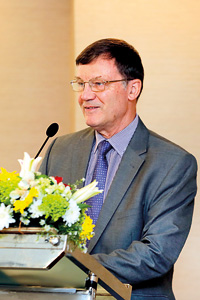Businesses transforming as trust and integrity play key roles
British author Michael Smith, who was in Colombo recently to launch his book titled “Leading with Integrity: Creating Positive Change in Organisations”, explained at an event in the capital the varied reasons why he wrote this book which looks at leading private companies with integrity and transparency.

The panel discussion.
The event was held at the Colombo Hilton and organised by the Sunday Times Business Club during its monthly meeting on February 12. The book was reviewed by the former Minister Sarath Amunugama.
It was Mr. Smith’s first visit to Sri Lanka although he had lived and worked in India as a journalist several decades ago. He was quite impressed by the cleanliness of the city of Colombo and said it was like stepping into paradise as a matter of fact.
His book focuses on leadership of integrity in business and the global economy as a whole. It also focuses on the transformation of change in human mind and spirit which leads to leadership of integrity. He said he wanted to highlight the value of integrity that builds trust in businesses and the economy.
Two factors
The book was inspired by two factors based on based on international conferences on the theme of Trust and Integrity in the global economy of which he was on the organising group and held each summer for a decade, 2006 to 2016 in a Swiss Alpine village of Caux and a similar series of business forums held in the Asia Centre of Initiatives of Change International in Panchgani, India since 2006 for almost a decade.
The book draws on stories emerging from those forums and it includes some 60 case studies of best practices especially at a time when climate change has become critical to all parties. The work was also inspired by his personal interest as a journalist given his family history. His late father and his forebears ran a wool textile factory employing 1100 people in the north of England city of Bradford where his great grandfather was twice elected as the Mayor in the 1890’s. Sadly the wool mill closed down in the in 1950 due to errors of judgment during his grandfather’s generation which did not anticipate the rise of competition from artificial fibres. 

He said any focus on ethics in business has to address the responsibility of business towards climate change, global warming and the Sustainable Development Goals. While some politicians are in denial, businesses and the public are responding, such as the growth of electric vehicles and alternative energy sources – solar and wind.
Pillars of trust
He has written on the five pillars of trust in the economy: Sustainability, Integrity, Cooperation, Purpose and Stewardship. When it comes to sustainability of the planet there is a story from a book about a man called Lawrence Bloom that involves his transformational change of heart. In the 1980s he made a fortune in the commercial property market in the city of London. He was in his early 30s and had a seven bedroom mansion in the North of London and a Mercedes parked outside. One day he said to himself: “Is this it? Is this all there is to life?” As a young man he had worried that he would not have enough money. Now he worried that he would lose his fortune. He faced an existential crisis. So he went on a binge –drinking spree for three years. ” Not very good for my liver,” he had said. Then he pulled himself together. He realised that he was not nurturing his soul. “You can call it what you like but that is what i call it.” He said needed to get into “right action.” He joined the Executive Committee of the Intercontinental Hotels, one of the world’s largest hotel chains. He was put in charge of their US$3 billion property portfolio and he decided that they needed an environmental manual. He and his team wrote it and one paragraph had a far reaching impact. It offered hotel guests the option of having a clean towel every day or keeping their same towel. At first the financial officer was appalled, thinking that hotel guests would not approve. But Mr. Bloom stuck to his proposal. He was certain it was the right thing to do, though he went through three months of sleepless nights, thinking he might lose his job. Luckily, he gained the support of the Chief Executive, a Dutchman and they agreed to this new practice.

Mr. Michael Smith introducing the book
Then Mr. Bloom said that they needed to share it with their competitors. There was consternation. But the CEO knew Prince Charles and said “I will talk with him.” They met Prince Charles at his country estate Highgrove. Prince Charles immediately saw the relevance and called together the CEO’s of the world’s largest hotel chains. He urged them to put into practice what became known as the Prince Charles initiative, though it was in fact Mr. Bloom’s. Thus towel recycling is now standard practice in 5 million hotel rooms worldwide.
Former Minister Amunugama said the book gives an overall view of the current economic scenario of major corporations and how they behave. In a globalised world a major phenomenon is the corporate entity where big companies have become the major trusting force of the modern globalized economy. The book rightly points out that the nature of that corporate entity is changing because of the next industrial revolution, the use of the electronic digital highway where new capitalists have merged as the biggest players in the global economy.


